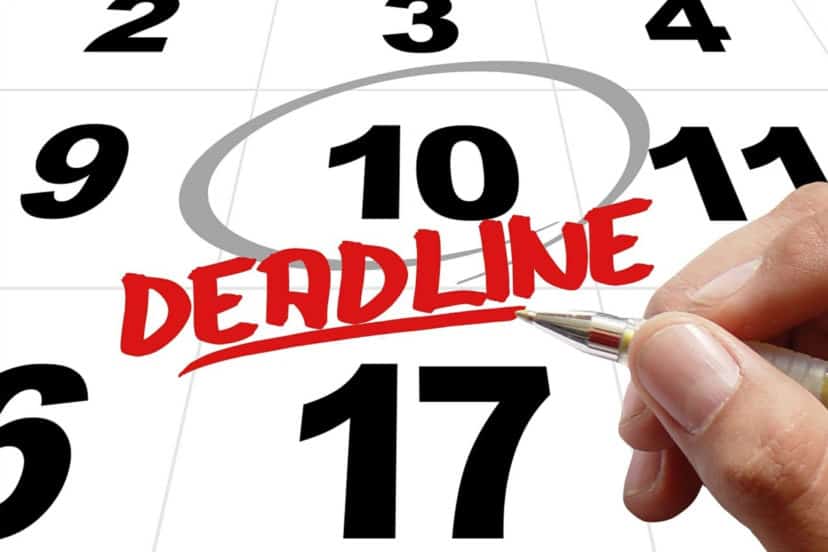12 Tips to Help You Meet Any Deadline

Remember when you got your first job, and you were excited to get to work? You got up early. Put on the office outfit you prepared the day before. You put on those shoes that were just cleaned and shined to perfection. You ate a good and healthy breakfast. Get to work with 15 minutes to spare-Alert, energetic, eager to take on your first task for the day.
Now is the present, your second year on the job. You woke up late, which made you late for work. You missed breakfast. Now you feel a slight throbbing at the top of your head, signaling the start of a major headache. And you have to start working on a new project whose deadline is in five days. Now you think, at my current state. How will I ever make that deadline? There is so much to do. And so much to coordinate? And so little time.
Don’t get me wrong. You still love your job. You’re just in those moments when you have to motivate yourself because it doesn’t come spontaneously all the time. And that’s normal like everything in life. We have our ups and downs in our job too.
So what can we do to help us meet that looming deadline?
But first, eat a healthy breakfast and walk outdoors for a few minutes to clear your head. You will feel better. You will be ready to take on anything after taking good care of you first.
Here are 12 tips to Meet Project Deadlines
1. Clarity of the project details. Be clear about what the project is all about. Be specific about the details of the project. Answer all the WH questions. The what, why, where, when, and how. Having all these details will prevent wasting time, money, and energy on things that are not needed and necessary for the project in the first place.
 2. Know the end goal. The expected outcomes should be clear and specific for both sides. That is why it is crucial to set aside for both parties to have a meeting and talk to list out everything in writing. And then the final contract agreed upon by both sides also in writing.
2. Know the end goal. The expected outcomes should be clear and specific for both sides. That is why it is crucial to set aside for both parties to have a meeting and talk to list out everything in writing. And then the final contract agreed upon by both sides also in writing.
Meetings today have been more accessible more than ever. Teleconferences, face chat, meeting online applications are available, eliminating the hassle of time and travel. The time spent preparing for the meeting instead of traveling to meeting places. Time and distance are now a none issue, but it is critical to take notes because our memories are not that reliable.
 3. Plan and write them out. Now that you know the project and the project details and the expected outcomes. You also know your deadline. You can now get your paper or your favorite whiteboard and start mapping out the things you need to do daily till your deadline. Break your project into daily goals and set activities as in a checklist that needs to be completed.
3. Plan and write them out. Now that you know the project and the project details and the expected outcomes. You also know your deadline. You can now get your paper or your favorite whiteboard and start mapping out the things you need to do daily till your deadline. Break your project into daily goals and set activities as in a checklist that needs to be completed.
When you break a large project down into daily activities that can be done in small chunks, you increase your chances of successfully meeting your deadline. More importantly, if you work on it consistently, daily, persistently, no rushing. Your project will not only be done on time but with high quality.
Last-minute rushing will not only create lousy quality projects. But like they always say,”Haste makes waste.” Time, money, effort, and energy go to waste just because you decided to procrastinate and do everything at the last minute.
3. Identify and write down your daily SMART goals. SMART standing for Specific, Measurable, Attainable, Realistic, and Time. All these daily goals should lead to the completion of the big goal, the final expected outcome.
When you have identified your smart goal and the activities for each goal, providing yourself awards for your efforts, indulge in small rewards like if you finish this activity by lunchtime. Treat yourself to lunch outdoors instead of eating indoors.
4. Overestimate your deadline. You know you can do this project in three days but set your deadline to four to five days instead. Write them in your planner.
You know your deadline but give your project some time to accommodate last-minute hitches when a project run does not run according to plan. There are always obstacles that we did not anticipate or plan for. Now, because we started early and gave ourselves that time cushion. We have adequate time to take a step back, change, adjust, tweak your plan to accommodate the new plan.
If you do happen to complete your project before you quoted the deadline, you are happy. Your employer or client will be happy, and they will feel good about you as an employee. Who knows a bonus may be in store as a show of appreciation that you’ve “gone the extra mile” to turn the project in before it was due.
5. Have a Timeline. A timeline is just a linear representation of the time and the activities in the order they should occur in the project. I make it a point to write my timelines on my dry erase white sheet that I have on my office wall as a constant reminder of my timeline.
6. Do It Yourself or Outsource. Now that you know the complete details of the project. Is it a project that you can do everything by yourself and meet the goals and the deadline. Or are there tasks that you have identified that you may need to reassign or outsource to meet your timeline.
7. Sense of Commitment. Commit and declare that you will finish your project on or before the due date. By doing this, you are holding yourself accountable. You take on the responsibility to get up every morning and focus on the activities to finish your project by the deadline. With me, perception and my work ethics are high in my priority. So that pushes me on because I do not want to be seen as unprofessional or unreliable.
So if that means staying up late to complete tasks assigned for that day, then so be it.
 8. Focus and work on one project one at a time. Focusing on this project, and this project alone is the best. Only schedule projects after your anticipated deadline on this project were reached. This is not only good for the project but to you as well. Overcommitting yourself will only result in poor quality work and stress you out.
8. Focus and work on one project one at a time. Focusing on this project, and this project alone is the best. Only schedule projects after your anticipated deadline on this project were reached. This is not only good for the project but to you as well. Overcommitting yourself will only result in poor quality work and stress you out.
9. Look at things from the other side’s perspective. Put yourself in your client’s or employer’s shoes. Let’s say you have a presentation by 9:00 am. And you asked your assistant to have the slides ready for the presentation at 9 am. When you check 15 minutes before the presentation, you’d expect that the slide presentation to be set up and ready to go. The only thing you need to do is to start doing the presentation and click away. And the slide presentation is not ready then you will be scrambling with your assistant to get everything ready. You will be stressed out and will definitely affect the quality of your presentation. You may appear unprofessional and unreliable.
You do not want this to happen if it was you, you would not want this to happen to your client who’s now depending on you. This should give you the push you need when you are feeling lazy, distracted, or unmotivated. Just apply the golden rule, which I use for everything,” Do not do unto others what you do not want done unto you.”
10. Start and keep going. The first step is always the hardest; the next steps after that becomes easier. So once you get your momentum going, keep going till you will breeze through the finish line. It also helps to know when you work best. If you know you work best in the morning, get all the big, major tasks done first so it can be completed when your energy is up, physically, and emotionally ready. See, when everything is on gear, tasks are completed better and faster.
11. Incentives. Offer a discount. In your contract, include a clause stating that the client will be granted a 10% discount if the material is turned in after the agreed-upon deadline. This will give your clients peace of mind, and it will motivate you to meet your deadlines so that you’re compensated wholly.
 12. Communicate and give updates. Communicating the completed steps and where you are in the project timeline not only helps you to be on track. It also lets the other side keep abreast of your progress in the project and that you are doing your best and not slacking off.
12. Communicate and give updates. Communicating the completed steps and where you are in the project timeline not only helps you to be on track. It also lets the other side keep abreast of your progress in the project and that you are doing your best and not slacking off.
It also provides an opportunity for feedback, and if obstacles are encountered, you can share this, and possible solutions can be discussed. Asking their input is good as it ensures a project that is up to par and what they want.
Importance of Meeting Deadlines
In whatever field you are in, whether you’re the business owner or the employee, even inside your family. Your business, employer, the family depends on your ability to meet deadlines efficiently. Therefore, learning how to meet any and all deadlines on projects you take on or assigned to you is a critical factor in maintaining a successful career, personal or business.
Like this Article? Pin it to Pinterest




